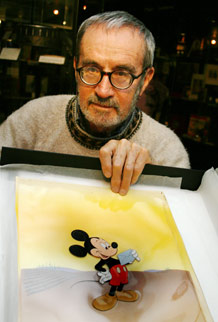
Disney expert Dr Robin Allan with an original Micky Mouse animation celluloid.
Disney originals expand collection
World renowned film scholar Dr Robin Allan, author of ‘Walt Disney and Europe’ has generously donated a new collection of Disney material to the University of Exeter’s Bill Douglas Centre for the History of Cinema and Popular Culture.
A graduate of the University, Dr Allan studied for a PhD on the European influences on the animated films of Walt Disney.
Dr Allan will also be sharing his first hand experience of meeting Walt Disney Studio artists from the golden age of animation who worked on iconic films such as Dumbo and Snow White, in a lecture on Friday 29 May. The ‘Artists of Disney’ talk is at the Queen’s Building University of Exeter, at 11am and is free of charge and open to the public. This special lecture forms part of a new series of events presented by the Bill Douglas Centre (BDC), to highlight the history of film and visual media archive.
The Disney collection is one of the foremost in the UK. Dr Allan has previously given original transcripts of interviews with the Disney’s artists in addition to books and notes made during his research and many books on the company and its art. This special collection of Disney items is called The Robin Allan Collection to mark his generosity and forms a significant part of the newly opened Animation section of the Centre’s library.
Dr Allan’s recent donations also include beautifully crafted and original animation drawings on celluloid made for Disney films. These rare items are from a period when Disney artists made thousands of drawings, which were then painted by female staff onto celluloid for filming. The craft and artistry behind Disney’s hugely successful films, such as Peter Pan and Alice in Wonderland are a reflection of the skill of such artists. The Walt Disney Company still retains worldwide recognition as a brand through films, TV, theme parks, merchandising and world wide sales. The BDC has Britain’s largest collection of Disney artefacts ranging from the 1920s to the present day.
Curator of the Bill Douglas Centre, Phil Wickham said, ‘Over the last 80 years Disney has had a considerable influence on shaping the imagination of children. The images and stories still have a huge cultural impact. We are really proud of the Disney collection and this new donation, added to our existing holdings, creates a very significant research resource on animation.’
The artefacts and transcripts collected provide the type of information that would not be easy or possible to find elsewhere. Experts like Dr Allan who have spoken to Disney artists working in the 1940’s and 50’s, are the remaining link to early Disney classics.
Through this extensive collection of material, MA Film students like James White are able to discover new takes on well known films. He said ‘Some of the information we now have would not have been published. During an interview with Disney artists one of them revels that they are not happy with Sleeping Beauty, saying that the story was weak. It’s interesting to see how this contrasts with Disney’s publicity.’
He added, ‘Robin’s interviews with Disney artists allowed me to quote from the source of production rather than subsequent writing. I was able to compare animators descriptions of the round design of Mickey Mouse to the perspective of an academic writing for a journal on popular culture.’
James has created a Disney exhibition at the BDC utilising artefacts from the Collection to illustrate the history of animation, which for him like the oldest Disney films has a fascinating and lasting appeal.
The wonderful world of Disney both on film and back stage was experienced by Dr Robin Allan whose generosity enables future research and the ability of others to share in the magic of animation. He writes that, ‘It seems appropriate that my collection should have a fitting home at Exeter, where I was awarded my PhD on the work of Disney. My PhD enabled me to complete my book, and that in turn led to the splendid Disney exhibition in Paris and Montréal, so I owe Exeter a debt of gratitude. I am keen that other students would benefit from access to the material I had collected for many years.’
Date: 29 May 2009
